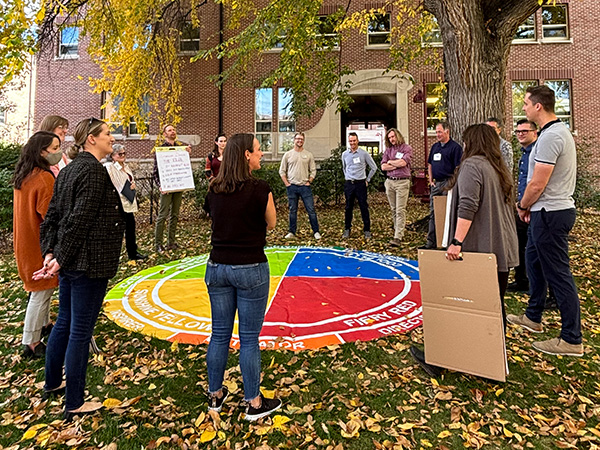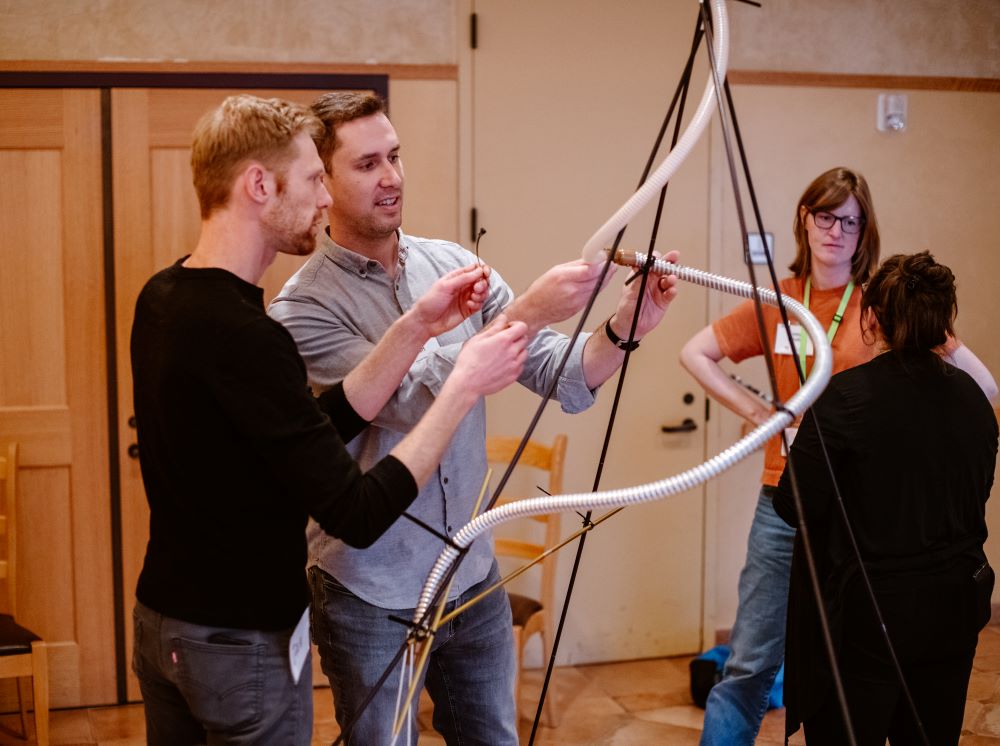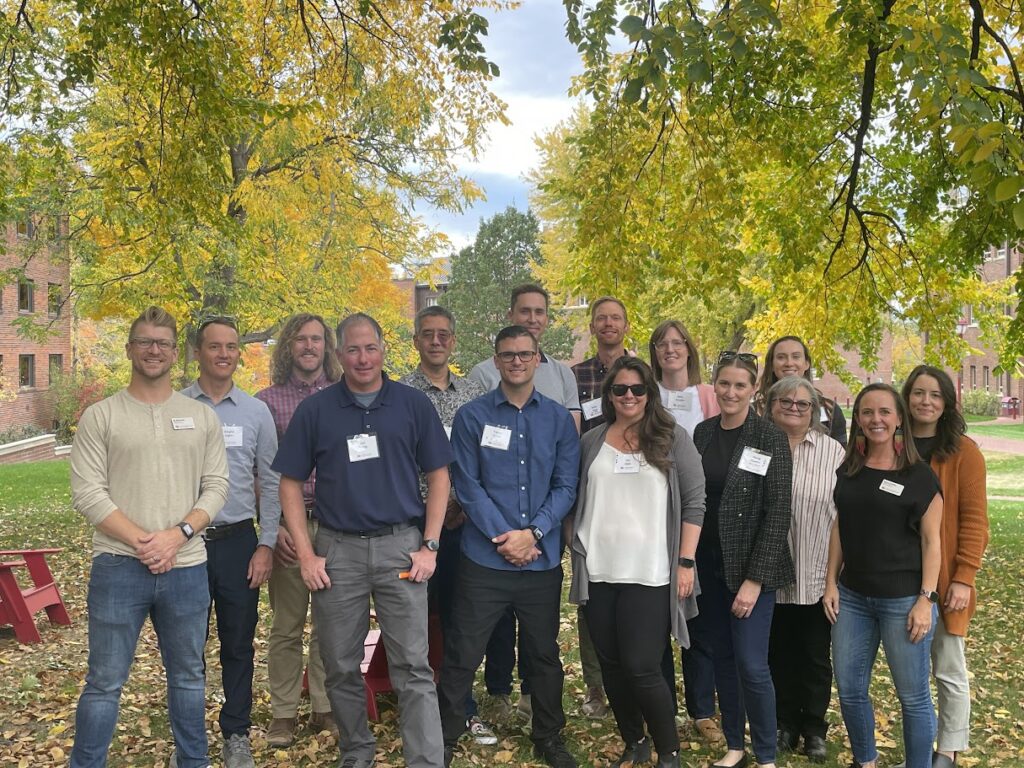 It feels strange to think about leadership as something that changes with the wind. But as our culture changes—and it has changed quickly in the past decade—leadership concepts do too.
It feels strange to think about leadership as something that changes with the wind. But as our culture changes—and it has changed quickly in the past decade—leadership concepts do too.
For 10 years now, the Daniels College of Business’ immersive Accelerated Leadership Experience (ALX) program has nimbly kept pace, equipping new-to-mid-level managers with the skills they need. ALX immerses its participants in a series of experiential learning exercises to get a deeper understanding of their communications preferences and discover strategies to lead in today’s unpredictable business and social environment.
Offered twice per year, ALX is composed of a three-day, in-person session, either at The Nature Place in Florissant, Colorado, or on the DU campus, followed by four half-day online sessions.
Swift and Significant Change
The conceptual framework of the in-person session the 20th cohort completed in October is decidedly different than it was for the first cohort in 2014.
“The generational shift from Boomer to Millennial and now Gen Z has brought new expectations around transparency and the need for work to be purpose-driven,” said Brian Elizardi, who is an adjunct faculty member at Daniels Executive Education. Elizardi, who participated in the first session as an administrator, now teaches ALX.
“Workers want more of a collaborative style rather than the command and control or cult of personality approaches to leadership that defined the 1990s or 2000s,” he added.
Elizardi cites four other significant social or macroeconomic disruptors that also have, as he says, “taken the rails off work” and prompted changes in how companies approach leadership: the Me Too movement, the George Floyd protests, the COVID pandemic and the resulting Great Resignation.
He explains how these disruptors have affected the workplace using a U.S. Army concept called VUCA (pronounced VOO-ka), which stands for volatility, uncertainty, complexity and ambiguity. Elizardi says it’s an apt framework for understanding the current challenges of leadership.
“ALX moves VUCA from the military context to today’s business world,” Elizardi said. “Our environment is volatile, it’s uncertain. The landscape is complex. So how do you, as a leader, navigate through that?
“VUCA helps us better understand the landscape as it relates to leadership today. We don’t know what’s around the corner. We can’t predict with any level of certainty.
“Ten years ago, we had standard playbooks for using different collaboration styles, leading an organization toward results or establishing a clear and elevating purpose,” he added. “Fast forward to today, volatility and uncertainty have changed the game; a hands-on, experiential approach is the ideal way to learn how to address it.”
The X in ALX
On a warm late-October day, as leaves fell on a lawn just outside DU’s Joy Burns Center, the 20th ALX cohort gathered around a four-colored mat, each sector representing certain behavioral characteristics that translate into communications preferences.
Elizardi’s ALX co-faculty, Bo Storozuk and Karen Collins, were taking the group through the exercise in Insights Discovery, an interactive learning module focusing on personal communications styles, team dynamics and workplace communication.
Participants representing each of the four preferences were assigned tasks focused on appealing to a different color, or communications preference.
Members of the blue team—who tend to be formal, precise, deliberate and questioning—were tasked with developing an outline of a travel brochure for members of the yellow team—who tend to be demonstrative, enthusiastic, persuasive and dynamic. After a 15-minute planning session, the blues presented their work to the yellows, who provided feedback on its effectiveness.
Participants’ Insights Discovery findings take on deeper meaning with other experiential exercises at the three-day Nature Place retreat.
“One of our jobs in ALX is to put people into situations that help them better understand their preferences and their strengths; how they show up,” Elizardi said. “We put them in situations that challenge those assets and give them an opportunity to experience what it’s like to dial up some of their less dominant characteristics.”
Elizardi described an orienteering exercise where teams of mixed-preference participants work together to navigate across a forested area to a certain spot—a goal—using a map and compass.
“The idea is to put you in a place of discomfort, but with people who provide a sense of safety,” he added. “You navigate the terrain together while individually experimenting with different ways of being a leader. People with a quieter style experience what it’s like to activate their voice. More extroverted people dial up their listening and empathy skills.”
 Same as it Ever Was
Same as it Ever Was
While the leadership concepts have changed, Insights Discovery is an example of how ALX’s focus on experiential learning has remained the foundation of the program over its 10-year run. Elizardi believes that experiential activities are particularly well suited for learning coaching skills, which are the heartbeat of ALX.
“As ALX has evolved, we’ve doubled down on coaching as one of the new leadership literacies that is effective in working in this VUCA environment,” Elizardi said. “We now have a leader as coach, focusing on providing their teams with the psychological safety they need to perform and helping them meet their sense of belonging to help them achieve and get the work done.
“A traditional management mindset wants to just tell people what to do,” he added. “But what we know is that there’s so much embedded in how we show up at work. The younger generations are bringing so much more of their identity to the workplace. They’re much more willing to say: ‘If you don’t share my values, then I’m willing to leave.’”
Leadership Concepts Applied
Although the program’s activities can vary by session, ALX participants value its experiential approach.
Delta Dental of Colorado rolled out ALX to its entire leadership team, which participated over several cohorts.
“It’s hard for me to put into words, but I love that program,” said Heather Brevik, human resources director at Delta Dental. “For me, the leadership piece was secondary to learning about myself. It was learning about how to handle situations and understanding how I was going to react, how I was going to be interpreted.”
Brevik recalled a lunch in a Blind Cafe, which was facilitated by a blind artist and business owner.
“It’s literally a blind lunch; having lunch in completely blacked-out room,” said Brevik. “You have to follow the person in front of you to find your table. You have to trust them and you have to be able to sit down and be able to eat a full meal in the dark.
“You can’t see your food, you can only smell it [and touch it],” she added. “You have to work as a team within your table. Okay, the water is at two o’clock and passing rolls and dishes around but being pitch black. Two people at our table were brought to tears because it was just such an overwhelming experience, but it just taught us to rely on ourselves and the people next to us.”
Putting his Insights Discovery findings into practice was especially insightful for Steve Delp, vice president of sales at Denver-based Kaseware, who served as a non-commissioned officer in the U.S. Army for eight years.
“It’sa huge difference leading people in the private sector where the element of command doesn’t exist, or if it does, it’s a horrific practice,” Delp said.
“I found great value in learning about and applying leadership from the perspective of inspiring or collaborating versus ordering someone to do something,” he added. “The Insights Discovery piece and being able to put our learnings about communications preferences into practice was a one of the more impactful aspects of ALX.
‘We went through a high ropes course, which wasn’t a challenge for me given my military background,” Delp added. “For me, it was more of the exercise of engaging with people who have different backgrounds and communications styles, and working with them in a safe, trial-and-error environment.”
The second decade of ALX begins with the program’s 21st cohort on April 2, 2025. Space is limited and information is available at: https://daniels.du.edu/executive-education/workshops/accelerated-leadership-experience/.

The 20th cohort of the Accelerated Leadership Experience.
